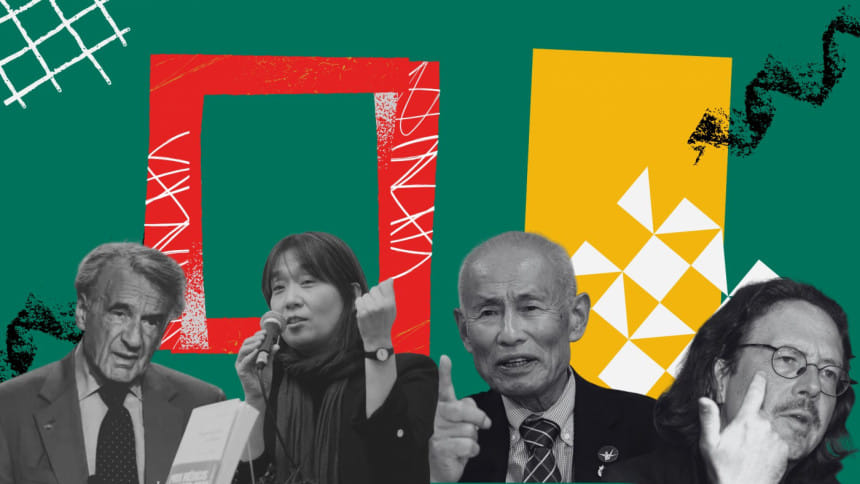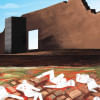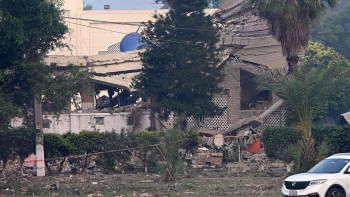Apathy, Han Kang and the Nobel Prize for literature

At this point, controversies should not be a surprise when it comes to the Nobel prizes, especially not for literature. With a sexual assault scandal, the awarding of a genocide denier and its random awarding of Bob Dylan when thousands of living writes sit unrecognised, it seems that the foundation is on a downward climb to ruining its reputation. Its awarding of Han Kang seemed to be one step in the right direction. After all, as a colleague shared, it was the first time people may have actually read the work of a Nobel Laureate before they had won.
However, this should be seen in another light.
The Swedish Academy's stated reason for the prize was Kang's "intense poetic prose that confronts historical traumas and exposes the fragility of huma life". The week in which Kang won the prize was the week in which Shaban al-Dalou was burned alive. Shaban, a 19 year old software engineering student died in Gaza, his last moments showing the silhouette of his body thrashing around, and the thin string of his IV drip moving with him. However, it is not merely this atrocity amidst the thousands of atrocities that ties the current situation in Palestine to Kang's writing; it is also in the specifics of what Shaban suffered, the situation being so similar that it borders on becoming an absurdity.
In a podcast for Louisiana Literature in 2021, Kang discusses the very real massacre of Gwangju that was a pivotal moment in both her life and her writing. She mentions a specific incident of a high school girl donating blood for victims and being shot dead as she was returning home. Shaban al-Dalou, much like many of the other Palestinian youths he saw killed before dying a horrifying death himself, did not just attempt to assist his own family, but attempted to help the larger community around him even as his individual world collapsed. Much like the girl Kang mentions, Shaban too donated his blood.
Kang, being the first South Korean to win a prize in this category, declined a press conference, and refused to celebrate. Kang's exact words in explaining why she asked her father to not hold a celebratory banquet was, "I want to be quiet and there are many troubles in the world, and maybe we should be more calm". The word "quiet" for an individual is already a word with weight that tilts it to the side of complicity. However, the word "quiet" for an institution is a part of systemic denial, one assisted by colossal force and financed by billions from a country deploying the verbiage of freedom, but still acting like an imperial entity.
Seen in this light, there is a kind of irony in Han Kang being awarded the Nobel Prize, and irony is just the mild word in this situation. If we are to shed our pretense of not feeling too much to appear neutral, unaffected and hence "objective" in how we judge literature, we might perhaps be able to say what many are truly feeling: that it is near absurd if we're being euphemistic, and revelatory of the deep apathy if we're being realistic, of a Western prize giving committee to pick an author whose works deal with historical atrocities. Adding even more layers to this, they picked an author with lived experience of the atrocity herself, and this at a time when about 42,000 Palestinians are said to have lost their lives to Israel's aggression.
In the aforementioned podcast, Kang states that she did not interview the survivors of the Gwangju massacre, instead just sticking to talking to the people she knew, as she did not want to reopen their wounds. This sensitivity is not something we should expect from the Nobel Foundation at this point. They did after all award it to Peter Handke, the Austrian author whose denial of genocide in Bosnia stirred up a storm of controversy for the Nobel Foundation.
There are those who may claim that the judgment of an author's literary abilities must not include their personal lives, that the committee may not have investigated Handke's close associations with Slobodan Miloslevic, the former president of Serbia who was the first sitting head of state to be convicted for crimes against humanity and for whom Handke delivered a eulogy at his funeral. However, the committee's choice becomes less excusable when one learns that in both 2006 and 2014, Handke being awarded prestigious prizes generated outrage among both ordinary individuals and rights organisations. Is it then an unreasonable expectation that a committee dedicated to selecting winners must have gotten wind of this, and would have then investigated the reasons for the strong objections? That same year, the committee also selected Olga Tokarczuk, a Polish writer who spoke of her native Poland's history of being a coloniser itself, enraging rightwing Polish patriots whose narrative of Poland as a "survivor of oppression" got marred by the claims of the author. Perhaps unsurprisingly, Tokarczuk spoke out vocally against the Frankfurt Book Fair's decision to cancel an award ceremony for Adania Shibli,, the Palestinian author whose work Minor Detail is based on an actual incidence of a Bedouin girl being raped and murdered by Israeli soldiers in 1949.
The Nobel Foundation is no stranger to awarding those aligning themselves with those committing genocide. Elie Weisel, a survivor of the Holocaust and a winner of the Nobel Peace Prize, was in support of the Israeli settlement of East Jerusalem. In contrast, this year's Novel Peace Prize went to Nihon Hidankyo, an organisation whose representative director Toshiyuki Mimaki said upon learning of the win, "In Gaza, bleeding children are being held by their parents. It's like in Japan 80 years ago". The lashout from Israel's ambassador to Japan, by now a tired routine of Israeli spokespersons to those still paying attention, signals that speaking up, no matter how gently, causes gashes in Israel's attempts to extinguish a population it has been tormenting for 75 years.
If we see silence as just an absence, it absolves the silent of their act of erasure. There is no news yet, of Israel being uninvited to the Nobel ceremony in the manner in which Russia, Iran and Belarus were in 2023. Till now, it seems that Kang will be attending the awards ceremony in December. We can hope, that much as Harold Pinter did in his Nobel Prize speech in 2005 when he vociferously opposed the war in Iraq, that Kang will be what Pinter described as a writer who will "smash the mirror" for the truth to come out.
Aliza Rahman is a member of the editorial team at The Daily Star.
Views expressed in this article are the author's own.
Follow The Daily Star Opinion on Facebook for the latest opinions, commentaries and analyses by experts and professionals. To contribute your article or letter to The Daily Star Opinion, see our guidelines for submission.

 For all latest news, follow The Daily Star's Google News channel.
For all latest news, follow The Daily Star's Google News channel. 










Comments